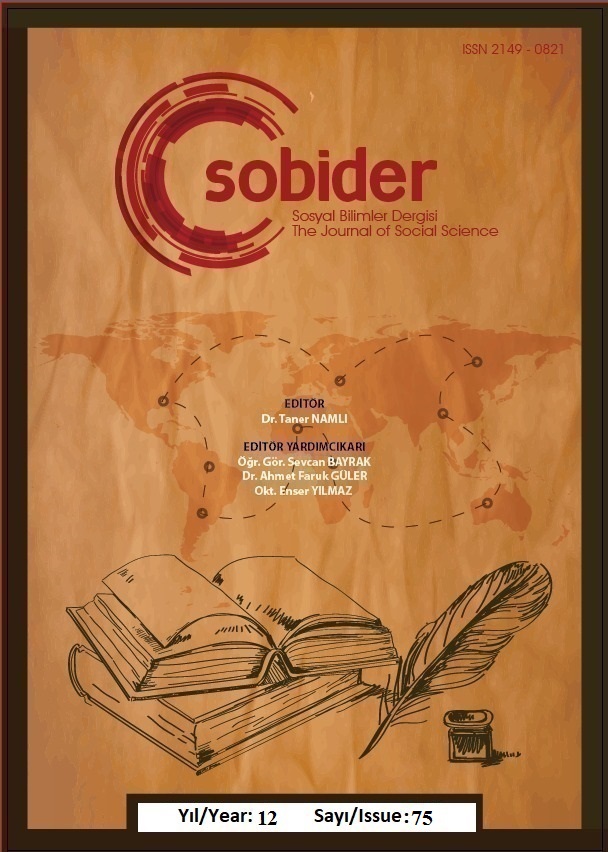Author :
Abstract
II. Dünya Savaşı'nın sona ermesiyle birlikte, dünya genelinde yeni bir düzenin inşa edilmesi süreci başlamıştır. Bu bağlamda, uluslararası çatışmaları önlemek ve uluslararası iş birliklerini güçlendirmek amacıyla Birleşmiş Milletler (BM) teşkilatı kurulmuştur. Aynı dönemde, Sovyet Sosyalist Cumhuriyetler Birliği (SSCB) ile Amerika Birleşik Devletleri (ABD) arasındaki gerilimler, dünya genelindeki pek çok ülkeyi etkileyen Soğuk Savaş'ın başlangıcına yol açmıştır. Bu çatışmanın en belirgin tezahürlerinden biri ise Kore Yarımadası'ndaki Kore Savaşı olmuştur. Stratejik konumu nedeniyle tarihsel olarak birçok devletin işgali altına giren Kore, II. Dünya Savaşı sonrası 38. enlem ile ikiye ayrılmış; kuzey kısmı SSCB'nin, güney kısmı ise ABD'nin etki alanına girmiştir. SSCB'nin yayılmacı politikaları karşısında Batılı devletler, askeri, siyasi ve ekonomik iş birliği yapmak üzere bir araya gelmiş ve bu süreç NATO'nun kuruluşuna zemin hazırlamıştır. Türkiye, SSCB tehdidine karşı güvenliğini sağlamak amacıyla NATO üyeliği için başvuruda bulunmuş, ancak bu başvuru kabul edilmemiştir. Kore Savaşı'nın patlak vermesiyle birlikte Birleşmiş Milletler’in çağrısına uyarak Güney Kore'ye destek olarak giden Türk askerleri, savaşta sergiledikleri üstün başarılarıyla uluslararası kamuoyunun dikkatini çekmiştir. Türkiye'nin bu katkısı, 17 Ekim 1951'de NATO'ya üye olmasına yol açmıştır. Diyarbakır halkı, Kore Savaşı sürecini yerel ve ulusal basın aracılığıyla takip etmiş, Diyarbakır’a bağlı askerlik şubelerinden Kore Savaşı'na katılan 202 askerden 193'ü gazi, 9'u ise şehit olmuştur. Şehit olan Türk askerleri, Kore'de defnedilmiştir. Çalışmamızda, Diyarbakır yerel basını esas alınmış, arşiv kayıtları, basılı ve süreli yayınlardan faydalanılmıştır.
Keywords
Abstract
With the conclusion of World War II, a new global order began to emerge. In this context, the United Nations (UN) was established with the aim of preventing international conflicts and strengthening international cooperation. During this period, tensions between the Soviet Union (USSR) and the United States (USA) led to the onset of the Cold War, which would affect numerous countries around the world. One of the most prominent manifestations of this conflict was the Korean War on the Korean Peninsula. Due to its strategic location, Korea had been occupied by various states throughout history, and after World War II, it was divided along the 38th parallel: the northern part fell under the influence of the USSR, while the southern part was placed under the influence of the USA. In response to the expansionist policies of the USSR, Western states began to form military, political, and economic alliances, which ultimately led to the establishment of NATO. Turkey, seeking to secure itself against the threat posed by the USSR, applied for NATO membership; however, its application was initially rejected. With the outbreak of the Korean War, Turkish soldiers, responding to the United Nations' call for support, were sent to assist South Korea. Their exceptional performance in the war drew the attention of the international community. As a result of Turkey's contribution, it became a member of NATO on October 17, 1951. The people of Diyarbakır closely followed the progress of the Korean War through local and national media. From the military branches of Diyarbakır, 202 soldiers participated in the Korean War, of whom 193 were wounded and 9 were martyred. The Turkish soldiers who lost their lives were buried in Korea. In our study, the local press of Diyarbakır was taken as the primary source, and archival records, printed materials, and periodicals were utilized.





